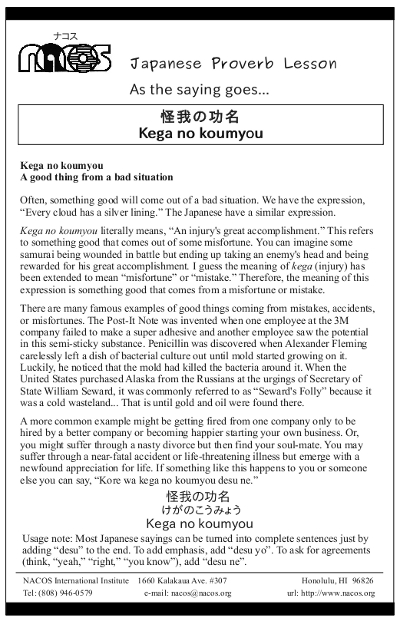Kega no koumyou
A good thing from a bad situation
Often, something good will come out of a bad situation. We have the expression, “Every cloud has a silver lining.” The Japanese have a similar expression.
Kega no koumyou literally means, “An injury's great accomplishment.” This refers to something good that comes out of some misfortune. You can imagine some samurai being wounded in battle but ending up taking an enemy's head and being rewarded for his great accomplishment. I guess the meaning of kega (injury) has been extended to mean “misfortune” or “mistake.” Therefore, the meaning of this expression is something good that comes from a misfortune or mistake.
There are many famous examples of good things coming from mistakes, accidents, or misfortunes. The Post-It Note was invented when one employee at the 3M company failed to make a super adhesive and another employee saw the potential in this semi-sticky substance. Penicillin was discovered when Alexander Fleming carelessly left a dish of bacterial culture out until mold started growing on it. Luckily, he noticed that the mold had killed the bacteria around it. When the United States purchased Alaska from the Russians at the urgings of Secretary of State William Seward, it was commonly referred to as “Seward's Folly” because it was a cold wasteland... That is until gold and oil were found there.
A more common example might be getting fired from one company only to be hired by a better company or becoming happier starting your own business. Or, you might suffer through a nasty divorce but then find your soul-mate. You may suffer through a near-fatal accident or life-threatening illness but emerge with a newfound appreciation for life. If something like this happens to you or someone else you can say, “Kore wa kega no koumyou desu ne.”
Usage note: Most Japanese sayings can be turned into complete sentences just by adding “desu” to the end. To add emphasis, add “desu yo”. To ask for agreements (think, “yeah,” “right,” “you know”), add “desu ne”.


